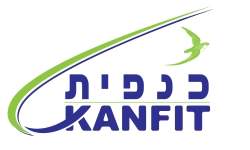Entrepreneurial spirit is alive and well in Israel. A case in point is Kanfit (Migdal HaEmek, Israel), near the city of Nazareth. Founded in 1986 as a composite tool workshop by Shai Fine, an aeronautical engineer with extensive experience building military jets, Kanfit, today, is primarily a build-to-print facility, with some build-to-spec work.
It makes both composite and metallic parts for what Shachar Fine, Shai Fine’s son and Kanfit’s executive VP of business development, marketing and sales, calls ‘fit-and-fly’ assemblies. Its business focii include the aerospace industry, of course – military, commercial and general aviation – but also medical devices, and wind energy, racing and ground defence applications.
“We are a one-stop shop,” says Fine, “and a zero-maintenance subcontractor.” By that he means that the company has the capability to make tools, perform prototyping, do first article inspection and, ultimately, serial production. Composite part production technology includes RTM, infusion, prepreg hand layup, wet layup and autoclave. Examples of parts run the gamut from cockpit and airframe structure and one-off medical devices to chaff and flare magazines (more on these below) and innovative tooling for prototyping.
Certifications include AS9100D and Nadcap. “Kanfit is the only company in Israel to hold Nadcap certification for RTM processing,” says Fine. It has been in its current location for four years, in a 3,200m² building that doubled its previous floor space, with metal part operations on the ground floor and composites processing on the upper floor. All laboratory capability is extensive and in-house for cost and lead-time advantage.
But Shachar Fine tells CW: “Our raison d’etre is to bring quality jobs to the north of Israel.” Among Kanfit’s 188 employees are native-born Israelis and immigrants from around the world, including Germany, Ethiopia, the US and former satellites of the Soviet Union: “Kanfit is a microcosm of the start-up nation,” explains Fine. “We believe we have the best and the brightest engineers here in Israel. This, combined with our nation’s chutzpah, is key to our success in this competitive business environment.”
Kanfit also works with the Technion – Israel Institute of Technology’s engineering school – providing jobs and internships for students to learn about tooling, composite design and materials. One area in which Kanfit supports the school is Formula SAE: “We help them design tools and parts, like fairings or driver seats, when they are here in our facility. We insist they make parts with their own hands, because we believe that enables engineers to design a better part. In CATIA, you can design everything, but in production, you find out you can’t make the part.” Kanfit also strongly supports workers with disabilities, says Fine, and has environmental programmes in place.
Kanfit’s diverse workforce makes an equally diverse mixture of composite and metal parts. For aerospace customers, these include wingtip fairings, wing-to-body fairings, wing-to-belly fairings, and main landing gear doors and radomes for business jet, military and defence projects. Some of these parts are honeycomb-cored, and Fine says more than 10,000 part numbers have been produced for those programmes.
Kanfit is a Tier 2 (or lower) supplier to The Boeing Co.’s (Chicago, IL, US) 787; the Airbus (Toulouse, France) A380; Embraer’s (Sao Paulo, Brazil) E2; Bombardier’s (Montreal, Canada) CSeries, CRJ, Global-series and Challenger; and Bell Helicopter Textron (Ft. Worth, TX, US). Other customers include Senior Aerospace UK (Rickmansworth, Hertfordshire, UK), Elbit Systems (Haifa, Israel), Zodiac Innovative Power Solutions (Eatontown, NJ, US), Plasan (Sasa, Israel), Israel Aerospace Industries (IAI, Lod, Israel), Rafael (Haifa, Israel), BAE Systems ROKAR (Jerusalem, Israel), BIRD Aerosystems (Herzliya, Israel) and ORBIT Communication Systems (Netanya, Israel). Kanfit also is a supplier to the Israeli Air Force (IAF) and Israel’s Ministry of Defense.
Furthermore, Kanfit supplies several large but proprietary unmanned aerial vehicle (UAV) programmes and, since 2013, has provided parts to the Israeli space industry, including a deployable dish for a satellite antenna. It has also assembled numerous medical devices for several clients.
Kanfit is also involved in considerable research and development activity and took delivery in May 2018 of an automated fibre placement (AFP) machine from Ingersoll Machine Tool (Rockford, IL, US) with a robotic arm-mounted head. Fine says the machine was purchased for prototyping of highly complex parts: “Kanfit will be the location of Israel’s AFP National Center of Knowledge for automated composites processing.” He cites, as an example, a one-piece structural frame consisting of dry carbon fibre automatically placed over foam core, which is then processed via RTM. The frames are prototypes for commercial aircraft bulkhead frames.
Another R&D project involves a European programme called EC Horizon 2020, and within that, a consortium called Hyperdiamond, which is developing a new cancer detection method using nano-diamonds. The technology employs very powerful magnets, and the magnets must be held, or constrained, within strong yet lightweight composite jigs: “Composites were the enabler for this project,” says Fine.
One additional realm that Kanfit has entered is 3D printing, but at present, all of this work is done using metal powders, primarily titanium. The company employs an EOS (Krailling, Germany) machine, but Fine says Kanfit is working on integrating metals with composite materials going forward.

